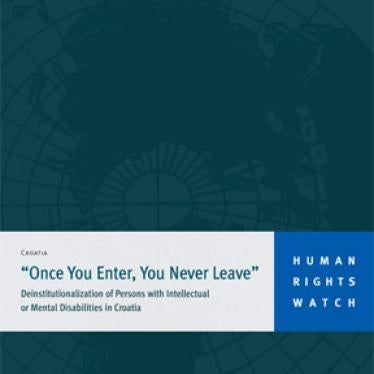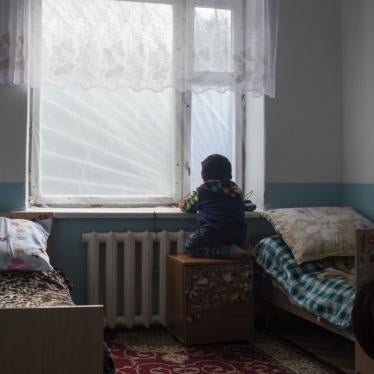(Brussels) - Croatia should carefully study the assessments of its human rights record expressed by the United Nations and the European Union on November 8 and 9, 2010, and accept and carry out their recommendations, Human Rights Watch said today. The UN and the EU expressed particular concern about the lack of progress on disability rights, war crimes accountability, and the treatment of Serbs and other minorities.
The UN Human Rights Council examined Croatia's human rights record as part of its Universal Periodic Review (UPR) process of each member country, and the European Commission issued its evaluation of Croatia's record in its annual accession progress report.
Several countries at the UN Human Rights Council review asked Croatia about the continuing institutionalization of people with intellectual or mental disabilities, while the EU Progress Report also noted that only "slow progress" has been made on deinstitutionalization, particularly for people with mental disabilities. Approximately 9,000 people with intellectual or mental disabilities live in institutions in Croatia - about 1 in every 500 Croatian residents.
"The UN and the EU have called on Croatia to promote the rights of people with disabilities, some of the country's most vulnerable people" said Amanda McRae, Finberg Fellow at Human Rights Watch. "Croatia should demonstrate its commitment to human rights by moving these individuals into the community and giving them a chance to lead full and productive lives."
In 2007, Croatia was one of the first countries in the world to ratify the UN Convention on the Rights of Persons with Disabilities, an international human rights treaty that includes a right to live in the community and not in an institution. In 2006, Croatia also promised the EU in conjunction with its accession negotiations that it would move people with disabilities out of institutions and into the community.
Despite these commitments, the number of people with intellectual or mental disabilities living in institutions in Croatia is increasing, Human Rights Watch found in a report issued in September 2010. Human Rights Watch also found that community-based housing and support options for these individuals had only marginally increased since Croatia's promises to the UN and the EU.
Human Rights Watch recommended that Croatia expand programs that promote community living for persons with intellectual or mental disabilities. Human Rights Watch also recommended that Croatia stop depriving individuals of their "legal capacity," the right to make important life decisions for themselves, so that they can make meaningful choices about where and how to live.
Croatia's delegation to the UN said that a comprehensive plan for deinstitutionalization would be adopted by the end of the year. The delegation also said it would try to reform legal capacity laws in line with the Disability Rights Convention and the recommendations by Human Rights Watch.
"Croatia's commitments this week to persons with disabilities are a positive step," McRae said. "But the real test is the action it takes to follow through on these commitments, bringing actual improvements to people's lives."
During its review before the UN Human Rights Council, Croatia said it had made progress in protecting vulnerable groups and in promoting human rights.
But the EU and UN reviews highlighted a number of human rights issues in need of improvement in Croatia, including a lack of fairness in its domestic war crimes prosecutions. As documented by Human Rights Watch and others, war crimes prosecutions in Croatia, a result of atrocities committed during the 1991-1995 war for independence from the former Yugoslavia, are sometimes biased against Serb defendants. Trials often are also conducted without the accused present, effectively denying them the opportunity to exercise their right to a defense.
The UN and EU reviews also emphasized the need for greater protection of minority groups, including Serbs. More than 75,000 refugees who fled during the war have not yet returned to Croatia, most of them Serbs. The UN and EU have called on Croatia to do more to provide support for those who still wish to return, including housing programs.
"Croatia can't move forward if doesn't deal with its past," said McRae. "Fair war crimes prosecutions and support for refugee returns are essential parts of that process."
Croatia has been negotiating to become an EU member state since 2005. In June, it opened negotiations on essential human rights reforms, a requirement for joining the EU.
The UPR was established under the General Assembly Resolution that created the UN Human Rights Council in 2006. It evaluates the human rights record of all 192 member states, with each state undergoing a review every four years. This week's review was Croatia's first.







